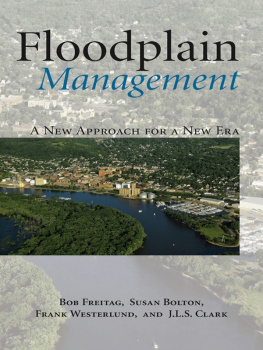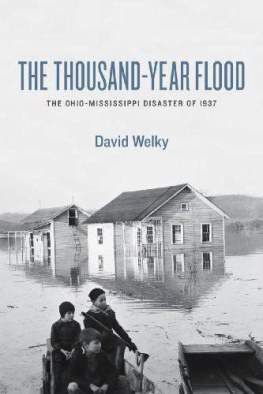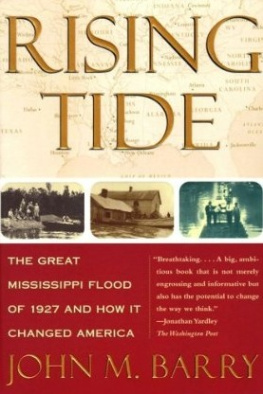WHEN THEY BLEW
THE LEVEE
Politics, Race, and Community in
Pinhook, Missouri
David Todd Lawrence and Elaine J. Lawless
University Press of Mississippi / Jackson
www.upress.state.ms.us
The University Press of Mississippi is a member of the Association of University Presses.
Copyright 2018 by University Press of Mississippi All rights reserved Manufactured in the United States of America
First printing 2018
Library of Congress Cataloging-in-Publication Data
Names: Lawrence, David Todd, 1972 author. | Lawless, Elaine J., author.
Title: When they blew the levee : politics, race, and community in Pinhook, Missouri / David Todd Lawrence and Elaine J. Lawless.
Description: Jackson : University Press of Mississippi, [2018] | Includes bibliographical references and index. |
Identifiers: LCCN 2017057200 (print) | LCCN 2018002938 (ebook) | ISBN 9781496817747 (epub single) | ISBN 9781496817754 (epub institutional) | ISBN 9781496817761 (pdf single) | ISBN 9781496817778 (pdf institutional) | ISBN 9781496817730 (cloth : alk. paper) | ISBN 9781496818157 (pbk. : alk. paper)
Subjects: LCSH: African AmericansMissouriHistory. | African AmericansMissouriSocial conditions. | African AmericansLand tenureMissouriHistory. | Disaster victimsMissouriPersonal narratives. | FloodsMississippi River. | LeveesMississippi River. | United StatesHistory. | Pinhook (Mo.)Race relations. | Pinhook (Mo.)Politics and government. | Pinhook (Mo.)History.
Classification: LCC E185.915 (ebook) | LCC E185.915 .L39 2018 (print) | DDC 305.896/0730778dc23
LC record available at https://lccn.loc.gov/2017057200
British Library Cataloging-in-Publication Data available
story supported by grant
Figure Foundation
when they blew the law
Dedicated to every person who ever
lived in and loved Pinhook, Missouri
Stories matter. Many stories matter. Stories have been used to dispossess and malign, but stories can also be used to empower and to humanize. Stories can break the dignity of a people, but stories can also repair that broken dignity.
CHIMAMANDA NGOZI ADICHIE, The Danger of a Single Story
PINHOOK ANTHEM
Faye Mack (former Pinhook resident)
When I was a little girl, living by the Mississippi, I called it home, my way of life; it was far, far from the city I love this place, this sacred space, where I always knew Id find peace and love, joy and happiness, unconditional for you.
The elders there they taught us much with little that they knew They put in us a sense of pride in everything we do Oh, I can hear them say, the Lord he gives and then he takes away Oh, blessed by the name of God, just continue, child, to pray.
Home that is my home that the Mighty Mississippi now calls its own My family flee, they run from thee, this one thing I know I love this place, this sacred space, I will never let it go.
The waters may wash away our land, our house, our farms But it can never remove the love of God for it keeps us in his arms So we thank you now God for what youve done and what youre going to do Bring back peace and love, joy and happiness, that can only come from you.
CONTENTS
PROLOGUE: RIVER RISING
In matters of race, silence and evasion have historically ruled the habit of ignoring race is understood to be a graceful, even generous liberal gesture. To notice is to recognize an already discredited difference. To enforce its invisibility through silence is to allow the Black body a shadowless participation in the dominant cultural body.
Toni Morrison, Playing in the Dark
4.24.11 Mississippi River gage at Cairo, Illinois, at 52.5 feet and rising
April 24, 2011, was Easter Sunday. The religious celebration at Union Baptist Church in Pinhook, Missouri, was undoubtedly a grand affair. People came from far and wide dressed in their finest Easter suits and dresses. Men gathered around the front door catching up on farming news, the rain, and planting dates while the women hugged each other, laughed, and chatted near the pews. New babies were adored and passed around. Children in new clothes and shoes must have dashed about the adults, running back to the fellowship hall where they could play freely. Hats were everywhere in abundance, graced with ribbons and flowers. The service was filled with song and prayer, passionate testifying, and a sermon full of gratitude and joy. The Pinhook choir rang the rafters with their songs of praise. Everyone looked forward to good food and fellowship that would last far into the afternoon. A perfect Easter Sunday. Perhaps the only damper on the day was the rain that never seemed likely to stop. But Pinhook was accustomed to lots of water. No one likely suspected this time would be any different.
4.25.11 Mississippi River gage at Cairo, Illinois, at 54.5 feet and rising
On the Monday following the Sunday Easter service, a small family of African American women gathered to watch television in their mothers home in Pinhook. It had been raining for days. Aretha, Debra, Twan, and LaToya Robinson could not have been aware that within the next several hours their lives would change in ways they could not even imagine. These women, sisters and mother, had been neighbors and friends their entire lives. Nearly every day they gathered after work in one of their homes to cook, share a meal, tell stories, can vegetables, and enjoy each others company. Over the evening, their small gathering would gradually accumulate other family and community members. Debras daughter and her son arrived, as did their brother David and their cousin Larry, and, likely, their long-time friend and neighbor George Williams. No one knocked on the door or called ahead that they were coming. Folks just arrived, parked on the grass, settled in, and continued conversations they had started the day before. Children, grandchildren, and neighbors kids ran in one door and out the other yelling to each other, grabbing a bite to eat from the table, heading for the next house to snag something tasty there as well, finding another friend to tag along. The sounds of conversation and laughter surely could be heard from the road.
Yall hear anything about the levee today? Debra may have asked as she lugged in several grocery bags and shut the door behind her with her right foot. The others may have told her no, they hadnt heard anything, but why did she ask? I heard at work theyre going to breach the levee if the gage at Cairo gets to 60 feet or higher. Did you all hear that? She was not yet convinced this was actually true. Even by six oclock, Debra wasnt terribly worried. There was nothing on the news, and the others sitting in her mothers living room did not seem to be concerned as they turned at least some of their attention to the television.
Debra probably kept an ear tuned to the television as she made dinner. She also started a cake to decorate later that evening for a friends birthday, while she carried on several conversations at the same time. She had to move carefully not to bump into her mother, who was now wheeling around the kitchen in a perfect choreography of food tasks. No one was quite sure how many people would be eating tonight. They never did. David might leave and go home, or he might stay and eat before heading out. LaToya might actually sit down and eat with them, or she might trill her fingers in good-bye on her way to someone elses house, or head home. It was a fluid congregation of people at ease in the house together. Greetings were simple, Hey, George, whats up, or David, get your dirty boots off that coffee table, or Aretha, did you hear from Miss Gertrude today? Hows she doin? Life in Pinhook was often slow, noisy, and quiet in turn, always pleasant and comfortable. Debra loved this moment of arriving home, cooking, sharing food and talk and laughter with the people she knew best and loved the most.







